| Srl | Item |
| 1 |
ID:
081210
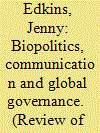

|
|
|
|
|
| Publication |
2008.
|
| Summary/Abstract |
In the aftermath of the 7th July 2005 bombings in London, communication with those searching desperately for relatives and friends was one-way or non-existent. The authorities dealing with the processes of the identification of the bodies of those killed or the treatment of those injured adopted procedures and protocols derived from emergency or disaster planning that were framed in terms of an instrumentalisation or objectification of persons. This article traces how these procedures reflect biopolitical forms of global governance that involve the production of life as 'bare life' and details how inappropriate and brutal these forms of governance seemed both to those searching for the missing and to the London Assembly 7th July Review Committee. It concludes that attention needs to be paid to the proliferation of such forms of politics as administration and the objectification they entail before we reach a stage where all life becomes nothing more than bare life, life with no political voice as such.
|
|
|
|
|
|
|
|
|
|
|
|
|
|
|
|
| 2 |
ID:
064522
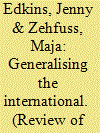

|
|
|
| 3 |
ID:
122648
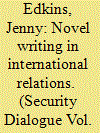

|
|
|
|
|
| Publication |
2013.
|
| Summary/Abstract |
Prompted by Elizabeth Dauphinee's The Politics of Exile, the article explores the political potential of novel ways of writing in international relations. It begins by examining attempts to distinguish between narrative writing and academic writing, fiction and non-fiction, and to give an account of what narrative might be and how it might work. It argues that although distinctions between narrative writing and academic writing cannot hold, there are nevertheless ways of judging the practical political effects that writing can produce. It briefly examines feminist, postcolonial and other international relations scholars who collect other people's stories or tell their own, and points to an instructive body of work in fiction and literary non-fiction beyond the discipline. It argues that writing that disrupts linear forms of temporality and instead inhabits 'trauma time' can open the possibility of an aesthetic political practice, and suggests that we foster such a creative practice in international relations.
|
|
|
|
|
|
|
|
|
|
|
|
|
|
|
|
| 4 |
ID:
121199
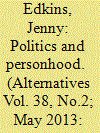

|
|
|
|
|
| Publication |
2013.
|
| Summary/Abstract |
The faces of the missing are held aloft on placards in demonstrations or posted on walls in the aftermath of disappearances. They appear massed on the pages of newspapers and in the displays of genocide museums. Often nothing more than family snapshots given a public place, such images can be compelling. Although photographs of atrocity and war have frequently been discussed, little attention has been paid to these other images: images that do not show suffering but still seem, at least potentially, to be politically effective. How do these photographs work? What form of personhood do they instantiate and what politics do they point to? How are they different from other photographs? This article examines what might be special about a photograph, especially a photograph of a face, and how its political impact might be understood. Drawing on Lacanian psychoanalytic concepts of trauma and subjectivity, the article suggests that a photograph embodies in its very temporal structure a personhood that is inimical to contemporary structures of sovereign power. The destabilizing political potential of a photograph, like that of certain forms of literary text, could be understood as arising from its potential as an encounter with the trauma that inhabits sovereign power and sovereign subjectivity but that is generally concealed. The account presented offers an alternative approach to the analysis of the politics of a photograph and gestures toward other manifestations of personhood and politics.
|
|
|
|
|
|
|
|
|
|
|
|
|
|
|
|
| 5 |
ID:
001438
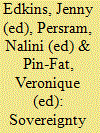

|
|
|
|
|
| Publication |
Boulder, Lynne Rienner, 1999.
|
| Description |
197p.
|
| Standard Number |
1555878032
|
|
|
|
|
|
|
|
|
|
|
|
Copies: C:1/I:0,R:0,Q:0
Circulation
| Accession# | Call# | Current Location | Status | Policy | Location |
| 040940 | 327.1/EDK 040940 | Main | On Shelf | General | |
|
|
|
|
| 6 |
ID:
182455
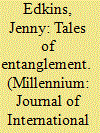

|
|
|